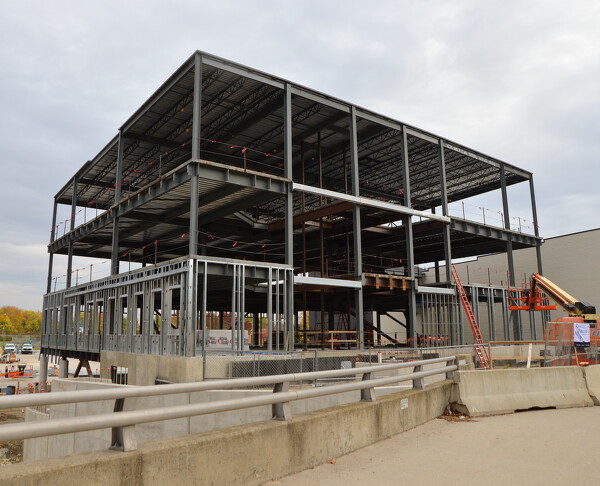Thursday, October 26th, 2023
Officials predict bill's passing could cost schools
By Abigail Miller
State legislation intended to halt rising property taxes could result in an over $500 million decrease in state funds to school districts and local governments over a three-year period, according to the Ohio Legislative Services Commission (OLSC).
House Bill 187 was crafted in response to quickly soaring property values. It would modify procedures used to conduct property tax sales-assessment studies.
The bill cleared the House on Oct. 11 and was introduced in the Senate last week.
At present, property taxes are calculated annually. The pending legislation, also known as the Ohio Homeowners Relief Act, would require property taxable values for tax years 2023-2025 be based on property valuation studies, with the three years preceding each tax year given equal weight, according to OLSC.
State Rep. Angie King, R-Celina, in a news release said the bill would help fight the steep rise in property taxes across the state.
"Across the district we are seeing anywhere from 15 to 60% increases on property valuations," King said in a statement. "With these dramatic of increases it is a real challenge for homeowners to financially prepare for the year-over-year increases. We are in real danger taxing our seniors, who live on a fixed income, right out of their homes."
However, OLSC states the legislation would reduce tax collections to school districts and local governments by an estimated $539 million over the three tax years.
The bill has sparked backlash from some local school district officials.
Minster Local Schools Superintendent Josh Meyer expressed his concerns in a letter to King.
"I am writing this letter in response to proposed House Bill 187," he wrote prior to it passing the House. "It is my belief that House Bill 187 would cause harmful unintended consequences."
The bill as proposed was not approved by any appraisal organization, Meyer said. He also said it would remove the auditor's value from the true market value, creating inconsistent and unpredictable results.
Moreover, Meyer said the bill would result in different approaches applied across county lines due to the differing views of each county auditor. This raises possible constitutional concerns as it would be impossible to ensure uniform taxation across the state, he wrote.
It poses a particular challenge to Minster as its boundaries cross county lines.
Meyer added that local governments and schools rely on these funds in the spring to pay their bills.
"This billing delay would be extremely harmful to local governments and schools, and negatively impact our most critical functions," he opined.
The largest portion of local revenue losses are attributed to tax year 2023 when a bigger share of the statewide property valuation is subject to reappraisals and update than in the following two years, according to OLSC.
Auglaize County Auditor Linda Bice said that if the legislation is enacted, the anticipated appraised value of the school districts would be much lower using a three-year average.
"Instead of a 30% increase that many schools are hoping for, it will be in the 13-19% range," Bice said. "This means the big bump in revenue that 20-mill floor schools were anticipating will not materialize. More revenue will be generated but not as much as anticipated."
According to tax.ohio.gov, a school district at the 20-mill floor of current expense taxes levied may not have its effective tax rate reduced below 20-mills. Once the effective tax rate reaches 20-mills, no further reductions in effective rates are made, allowing such districts to receive the full revenue growth from increases in taxable values on those mills.
HB 187 as passed in the House did not include a change in the 20-mill floor legislation.
Minster Local Schools Treasurer Laura Klosterman said the bill does, however, change how valuation is calculated for reappraisal districts.
"Under this bill, the valuation is an average of three years of selling price compared to the market value on the auditor's site," Klosterman said. "The difference for 2020 was 13%, 2021 was 25% and 2022 was 42%, making the average 27%. The forecast since November was estimating a 20% increase. If HB 187 does not go through, Auglaize County was to receive 14-28%."
She added that the valuation will also impact state funding.
"As values increase, our state share will decrease," Klosterman said. "For many districts, HB 187 will drastically change the valuation in state funding requiring the state to increase the state share."
Though most districts are within a single county, some have territory spanning multiple counties, according to OLSC.
"Both the House and Senate bills would make significant revisions to the district's TY 2023 valuations under the recent re-appraisal," said Jennifer Bruns, treasurer of St. Henry Local Schools.
St. Henry School district is at the 20-mill floor.
"The proposed amendment to limit growth of districts at the 20-mill floor to inflation essentially results in different floors applied for various districts, which also raises constitutional concerns to uniformity," she said.
House Bill 187 will now work its way through the Senate. The offices of King and Senate President Matt Huffman, R-Lima, did not respond to requests for comments on the bill.




